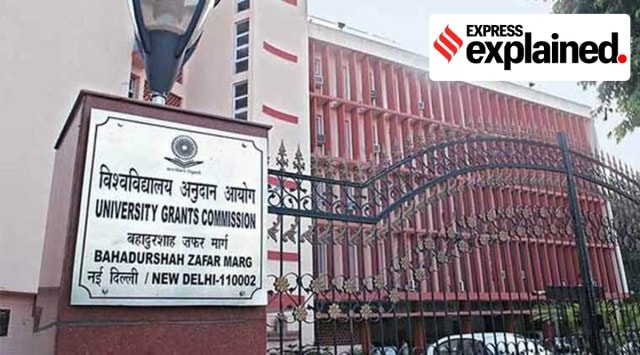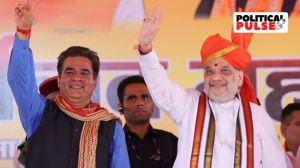- India
- International
UGC clears ‘professors of practice’ in all colleges, universities: who are they and what will they do?
No formal educational qualification such as a PhD is needed to apply for a position. However, a candidate must be a distinguished expert of a professional field. The idea is to bring practical experience into classroom teaching.
 To be eligible for appointment, an individual will have to be a “distinguished expert” who has “made remarkable contributions in their professions”, and has at least 15 years of service or experience. (File)
To be eligible for appointment, an individual will have to be a “distinguished expert” who has “made remarkable contributions in their professions”, and has at least 15 years of service or experience. (File)If you are a distinguished professional in any field but do not have a formal academic qualification such as a PhD, you can still be eligible for appointment as faculty in any college or university in India. The higher education regulator University Grants Commission (UGC) has issued new guidelines under which higher education institutes can create a new teaching position called Professor of Practice to hire experts from various sectors, in line with provisions that already exist in the Indian Institutes of Technology (IITs).
Who can apply for the post of Professor of Practice?
To be eligible for appointment, an individual will have to be a “distinguished expert” who has “made remarkable contributions in their professions”, and has at least 15 years of service or experience.
It is open to the institutions themselves to decide the sector from which they want to rope in professionals. A professor of practice can be anyone with a background in a diverse range of areas from technology, science, social sciences, media, literature, armed forces, law, fine arts, etc.
However, the position is not open for those in the teaching profession — either serving or retired.

But there must be a minimum academic eligibility criterion for appointment as professor of practice?
No formal academic qualification is necessary in order to be considered for this position if a person has been an “exemplary” professional in their field of work.
Currently, under the UGC’s minimum qualifications for appointment of teachers and other academic staff, an individual needs a PhD to be recruited as a professor or associate professor, and also needs to have cleared the National Eligibility Test (NET).
How will these appointments be made?
Universities and colleges will carry out appointments on a nomination basis. In other words, vice-chancellors or directors have been authorised to invite nominations for filling up posts, which cannot exceed 10 per cent of the sanctioned faculty strength of an institute.
After nominations are invited, those interested can send their applications with detailed biodata and a brief write-up about the ways they can potentially contribute. The applications will be considered by a selection committee comprising two senior professors from the respective institute, and one “eminent external member”.
Based on the recommendations of the committee, the academic council and the executive council of the institutes will take the final call on appointment.
Will professor of practice be a full-time position?
It can be either a full-time or a part-time engagement for at least four years. Initially, the hiring will be for one year. Based on performance, extensions may be given.
“The maximum duration of service of Professor of Practice at a given institution should not exceed three years and is extendable by one year in exceptional cases and the total service should not exceed four years under any circumstances,” state the guidelines.
How much will these faculty be paid?
The remuneration will be decided at the level of the institutes and the experts being hired. In some cases, universities can even approach industries for financial support.
Will the professors of practice be involved in regular teaching?
The guidelines say that the professors of practice will be involved in the development and designing of courses and curriculum, and will deliver lectures as well. They will also be expected to focus on enhanced industry-academia collaborations. They can also carry out joint research projects or consultancy services in collaboration with the regular faculty members.
What is the objective behind the initiative?
Firstly, India’s higher education institutes are understaffed, with thousands of vacancies across central and state universities. So the UGC is hoping that recruiting industry experts and professionals will help “augment faculty resources” in universities and colleges.
Second, it is aimed at addressing concerns about the quality of graduates being produced by Indian colleges and universities. The guidelines bluntly state: “Today’s industry looks for graduates with specific skill sets. But the higher education system is churning out graduates who fall short of the required skills.”
Around the world, the idea of a professor of practice aims essentially to facilitate and promote the integration of academic scholarship with practical expertise and experience. The UGC hopes that the professors of practice will introduce real world practices and experiences into classrooms for churning out industry-ready graduates.
Will this result in a reduction in the number of posts for qualified professors?
The UGC has clarified that the engagement of professors of practice will be exclusive of the total sanctioned posts of a university or college. It will not affect the number of sanctioned posts and the recruitment of regular faculty members.
More Explained
EXPRESS OPINION
Apr 26: Latest News
- 01
- 02
- 03
- 04
- 05









































